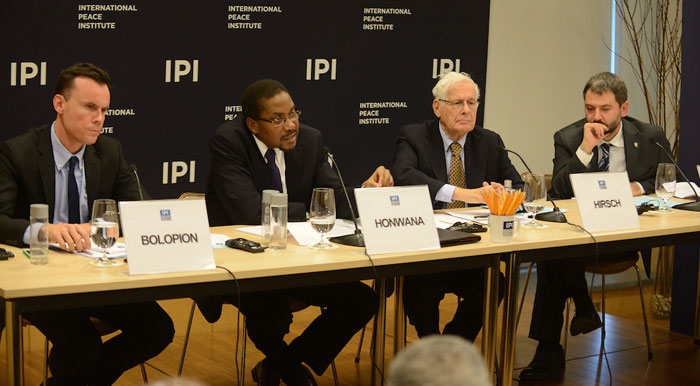
How to prevent catastrophe in the Central African Republic (CAR) was the topic of an event at the International Peace Institute on November 26th. Ten months after a military coup brought the current transitional government to power, the Central African Republic is wracked by massive human rights violations, sectarian violence, attacks on civilians, and reprisals by self-defense groups. Hundreds of thousands of people have been displaced, and there are fears of a possible genocide should the deteriorating crisis be left unattended.
UN Advocacy Director of Human Rights Watch, Philippe Bolopion, witnessed the aftermath of sectarian violence when he visited the CAR recently. He said the ex-Seleka fighters are a mobilized group of young men—many of them teenagers—in mismatched uniforms and flip flops armed with rusty Kalashnikovs.
“Seleka fighters had killed scores of civilians including women, children; they had looted, raped, burnt entire villages,” Mr. Bolopian said. He described a village not far from the capitol where 35,000 people were living in a squalid camp under constant threat. Mr. Bolopian said this Christian population—most of them only yards from their homes—would not leave these terrible conditions for fear of ex-Seleka militias.
In the same village, Mr. Bolopian said, he was surprised to learn that anti-Balaka groups, wielding machetes and spears, were terrorizing Muslim populations in similar ways. “I think this small place is a good example of what could happen in many other parts of the country where a cycle of attacks and reprisal attacks have left the place completely wasted,” he said.
The panel included Mauro Garofalo, the Community of Sant’Egidio; João Honwana, Africa II Division, UN Department of Political Affairs; and Mesmin Dembassa Worogagoi, Chargé d’affaires, Permanent Mission of the Central African Republic to the United Nations. The event was chaired by Ambassador John Hirsch.
There were five main points that emerged from the meeting:
1. The situation in the Central African Republic has been worsening for a decade, marked by several attempted military coups, sporadic violence, and other early signs of conflict recurrence. Yet, while early warning signals for the current crisis were abundant, early response failed. The lack of internal conflict prevention capacity and of international political will, combined with limited resources, have stood in the way of timely and effective action.
2. Restoring security is an absolute priority—it is needed to scale up and deliver humanitarian assistance, to better protect civilians, and so that human rights abuses can be properly investigated and the cycle of impunity broken. Security is also the key condition for the continuation of the incipient internal political dialogue.
3. Led by the national transitional council and local and international interfaith groups, reconciliation efforts need more support. For instance, the Republican Pact signed by the CAR authorities earlier this month constitutes a positive sign and could serve as a basis for renewed political initiatives. National stakeholders need to agree on a common vision for their country, and this requires leadership, political will, and ownership.
4. Countries in the region are actively searching for a solution, and greater engagement is needed. The African Union is due to deploy a continental mission (MISCA) in December to replace the current subregional force. MISCA will require resources and equipment to fulfill its mandate, and the UN Security Council is currently considering how it will support this force. However, the establishment of a larger UN force to stabilize the situation should not be delayed, and a coordinated international response should be pursued.
5. In the long term, only a comprehensive approach will provide a sustainable solution to the crisis. This calls for a robust political process, based on inclusive dialogue; effective disarmament, demobilization, reintegration, and security sector reform processes; and mechanisms to manage and monitor the exploitation of CAR’s rich mineral resources, to facilitate a more equitable sharing of these resources and ensure the country’s economic recovery.
In light of the severe crisis, the CAR is now receiving long-overdue attention from the international community. The panel agreed this represents an opportunity to break the cycle of conflict, and to prevent the situation from deteriorating further and posing a threat to regional and international peace and security.
“We have a historical chance to build the country like it’s not yet happened in the past—once the security is restored,” said Mr. Garofalo.
![]() Listen to the Global Observatory interview with Philippe Bolopion>>
Listen to the Global Observatory interview with Philippe Bolopion>>
Watch event:







